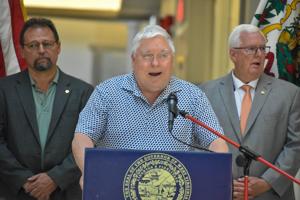West Virginia Governor Patrick Morrisey recently convened a press conference at Meadowbrook Mall in Bridgeport, actively promoting the eagerly anticipated annual sales tax holiday. This initiative, set to run from August 1st to August 4th, is specifically designed to provide significant financial relief to families gearing up for the back-to-school season, making essential purchases more accessible and affordable for residents across the state.
The sales tax holiday permits consumers to purchase eligible items, particularly those priced at $125 or higher, without incurring sales tax. This exemption aims to ease the burden on household budgets during a crucial period for consumer spending. The governor emphasized the direct benefit to families, highlighting the savings on school supplies, clothing, and other necessary items that typically add up quickly.
Delving into the origins of this popular financial relief measure, the sales tax holiday was notably spearheaded by Delegate Sean Hornbuckle, D-25, who championed the house bill establishing it back in 2019. During the press conference, while Morrisey underscored the importance of the tax holiday and its consumer advantages, he did not explicitly acknowledge Hornbuckle’s pivotal role in its legislative creation, a point of discussion among observers.
Beyond the immediate focus on the tax holiday, Governor Morrisey also subtly hinted at broader economic development initiatives poised for future announcement. He articulated a strategic vision that includes establishing critical data centers and microgrids, leveraging West Virginia’s abundant energy resources. Furthermore, his agenda encompasses a commitment to streamline government regulations and invest robustly in the state’s workforce, signaling a comprehensive approach to economic growth and sustainability.
Although specific details regarding these upcoming announcements remained under wraps, Morrisey indicated that the primary focus would be on the energy sector, promising significant developments. He even suggested the possibility of legislative surprises, hinting at a potential special session in the coming months, which could further accelerate these proposed economic transformations and policy shifts.
During his remarks, Morrisey expressed a degree of frustration regarding the limited media attention given to how previous state budget allocations have funded past income tax cuts. He contended that such crucial fiscal mechanisms, though necessary for financial stability, often go unnoticed by the public, despite their direct impact on the state’s financial health and the overall economy.
The Governor reiterated his belief that funding these tax cuts is a necessary component of responsible fiscal management, ultimately benefiting the taxpayer. He asserted that ensuring citizens have access to more of their own money is a fundamental goal, framing the tax cuts as a positive step towards improving the financial well-being of West Virginia residents and fostering a more vibrant economy.
However, an opposing perspective was articulated by Pushkin, who recalled the governor’s own earlier statements regarding a substantial $400 million hole in the state budget at the year’s outset. Pushkin critically noted that Governor Jim Justice’s prior tax cuts remain largely unpaid, cautioning that while the state might navigate the immediate fiscal year, it faces considerable financial challenges in the foreseeable future, potentially impacting public finance.
Pushkin further highlighted the significant advantages West Virginia has reaped from national legislative efforts, particularly investments stemming from the Inflation Reduction Act and the American Rescue Plan. He credited Democrats with ushering in these crucial programs, which he argued have provided substantial support and economic impetus to the state, underscoring the interplay of state and federal economic policies.






Leave a Reply